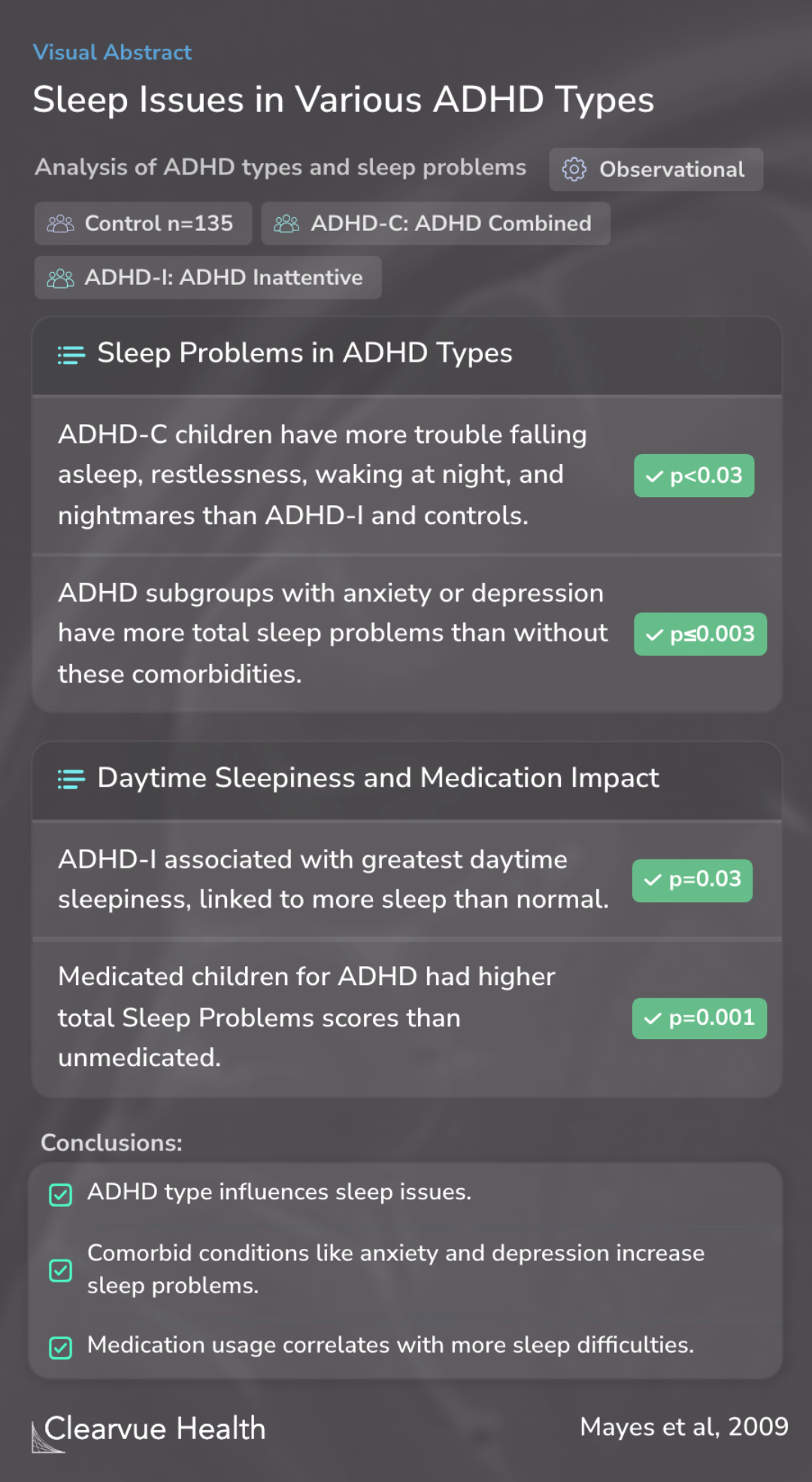ADHD subtypes and comorbid anxiety, depression, and oppositional-defiant disorder: differences in sleep problems
Sleep Issues in Various ADHD Types
Mayes SD, Calhoun SL, Bixler EO, Vgontzas AN, Mahr F, Hillwig-Garcia J, Elamir B, Edhere-Ekezie L, Parvin M

Objectives
The study focused on examining sleep problems in children with various types of Attention-Deficit Hyperactivity Disorder (ADHD). This exploration aimed to understand how different ADHD subtypes, and possibly other co-occurring disorders, affect children's sleep patterns.
Sleep problems were analyzed in children with ADHD (Attention-deficit hyperactivity disorder).
Methods
The authors utilized scales completed by the parents of 135 control children and 681 children with ADHD, specifically looking at those with the combined type (ADHD-C) or inattentive type (ADHD-I). These scales also took into account children who had comorbid conditions like oppositional defiant disorder (ODD), anxiety, or depression.
Scales were completed by parents of 135 control children and 681 children with ADHD combined type (ADHD-C) or inattentive type (ADHD-I) with or without comorbid oppositional defiant disorder (ODD), anxiety, or depression.
Results
The results of the study were quite revealing. Children with ADHD-I alone had fewer sleep problems and their experiences were similar to the control group. On the other hand, children with ADHD-C encountered more sleep problems compared to both the controls and the ADHD-I group. Interestingly, the presence of comorbid conditions like anxiety and depression further increased sleep problems, but ODD did not have a significant impact. Another notable finding was that children with ADHD-I experienced the greatest level of daytime sleepiness, which was linked to them sleeping more than usual. Moreover, the study found that children on medication for ADHD had more difficulty falling asleep compared to those not on medication.
Children with ADHD-I alone had the fewest sleep problems and did not differ from controls. Children with ADHD-C had more sleep problems than controls and children with ADHD-I. Comorbid anxiety/depression increased sleep problems, whereas ODD did not. Daytime sleepiness was greatest in AD...
Conclusions
The study concluded that sleep problems in children with ADHD vary based on the subtype of ADHD, the presence of comorbid conditions, and whether the child is on medication. This points towards a nuanced relationship between ADHD and sleep, influenced by various factors including the specific type of ADHD and additional mental health conditions.
Differences in sleep problems were found as a function of ADHD subtype, comorbidity, and medication.
Key Takeaways
Context
The findings of this study align with and expand upon previous research in the field. For instance, a 2013 study by Fair DA et al., which used functional MRI to identify different ADHD subtypes, found distinct neural patterns for two main ADHD subtypes. This earlier research supports the idea that different ADHD types can be distinguished not just behaviorally but also neurologically, which may impact treatment approaches.
Another relevant study by Molavi P et al. in 2020 explored how different ADHD types relate to cognitive skills and self-esteem in children. It found that children with different ADHD types showed varied cognitive abilities and levels of self-esteem. This suggests that like sleep problems, other aspects such as cognitive function and self-esteem might also be affected differently by various ADHD subtypes.